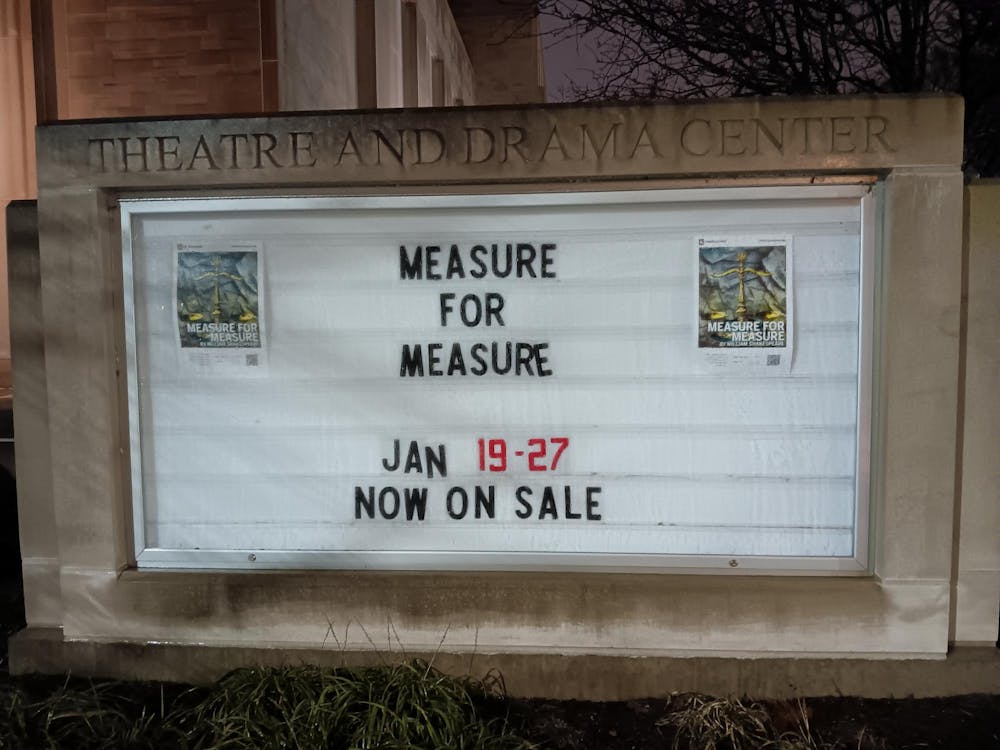Director Jenny McKnight’s pared down version of Shakespeare’s “Measure for Measure” is currently being presented by the IU Department of Theatre, Drama and Contemporary Dance in the Studio Theatre. The play opened Jan. 19 and runs through Jan. 27. While the show is currently sold out, those wishing to view the performance are advised to arrive at the theater 45 minutes before showtime to place their name on a waitlist.
“Measure for Measure” follows Isabella, played by IU grad student Sofia Salgado, a novice nun whose brother Claudio, played by IU junior Evan Anderson, is to be executed under Vienna’s fornication laws for getting his fiancé Juliet, played by IU junior Antonia Daleke, pregnant. Claudio asks Isabella to intercede on his behalf with Angelo, played by IU alum Bobby Ayala Perez, the ruler of Vienna while the noble Duke Vincentio, played by IU senior Adam Mohrs, is away. As one may expect from Shakespearean narrative, nothing goes according to plan.
McKnight said she enjoyed Shakespeare and his surprising understanding of women — citing a complexity not usually seen prior to his plays. She said that Shakespeare wrote women as more than one-dimensional, portraying them as real people.
“Isabella's not just a heroine or just a victim,” McKnight said, “We are still talking about the same things in 2024 that Shakespeare was writing about in 1604, and I think it’s interesting to contemplate that universality from a female perspective.”
“Measure for Measure” originally ends with the marriage of Isabella and Duke Vincento, even though she never verbally consents to the marriage. Despite being presented as a strong, complex character, Mohrs said this original ending robbed Isabella of her agency and was something McKnight’s production aimed to change.
“We very specifically wanted to stray away from that idea of it’s a marriage proposal or a marriage vow,” Mohrs said, “Instead of saying, ‘Hey, Isabel, be my wife,’ now it’s ‘rise up to me and be at my level of authority.’”
McKnight also knew when casting “Measure for Measure,” she wanted to uplift women, specifically by gender-flipping the role of Escalus. Mohrs said part of the transformative power of the ending came from women gaining authority, represented by Duke Vincentio’s gesture at the end of the play.
“The duke, especially at the very end, kneeling to both of them with everyone in the circle is furthering that idea of the two of them rising above the level of power and authority that otherwise wouldn’t have been granted to them in any other part of the play,” Mohrs said.
IU grad student Isabelle McNamara-Angel plays the gender-flipped Escalus in this production, changing the character from an old man to a young woman. McNamara-Angel said the change in the character’s gender made the story more applicable to the modern day.
“It made it really interesting why Escalus is kind of passed over and instead power is given to Angelo when the duke leaves,” McNamara-Angel said. “For me, it made the world feel even more real and relevant to our world today.”
IU senior Quinn Larkin, who was in the audience, said she also felt the show was relatable to today’s world with its themes of corruption amongst the powerful.
“[Measure for Measure] shows that in rare circumstances like this, someone of power actually sees a wrongdoing, that's the only way it can be solved,” Larkin said. “It just shows that justice can be served but there needs to be loopholes to get through.”
These themes are discernible from the beginning due to the intricate lobby design by IU masters student Sheridan Schreyer. Brick walls are covered in pieces of paper depicting the faces of women who testified against male harassment — barely visible from thick jailhouse bars. The theme of a jail continues with a door covered with metal bars that leads into the audience. Two large posters ask audience members to consider the questions, “should we always believe all women?” and “is the death penalty ever justified?”
Schreyer said the jail bars' purpose was to force the audience to look closer to see what was going on. She said today’s politicians accused of sexual harassment, like Angelo in “Measure for Measure,” often avoid being linked to the scandals due to their established reputations and public image while the women they harassed often bear the brunt of public reaction.
Following “Measure for Measure,” the IU Department of Theatre, Drama and Contemporary Dance will be presenting “Vox Pop! a Post-Democratic Musical” in the Ruth N. Halls Theatre Feb. 9-17. Tickets and information can be found on the Department of Theatre, Drama and Contemporary Dance's website.




